- Home
- Donis Casey
Hell With the Lid Blown Off
Hell With the Lid Blown Off Read online
Hell With The Lid Blown Off
An Alafair Tucker Mystery
Donis Casey
www.DonisCasey.com
Poisoned Pen Press
Copyright
Copyright © 2014 by Donis Casey
First E-book Edition 2014
ISBN: 9781464203015 ebook
All rights reserved. No part of this publication may be reproduced, stored in, or introduced into a retrieval system, or transmitted in any form, or by any means (electronic, mechanical, photocopying, recording, or otherwise) without the prior written permission of both the copyright owner and the publisher of this book.
The historical characters and events portrayed in this book are inventions of the author or used fictitiously.
Poisoned Pen Press
6962 E. First Ave., Ste. 103
Scottsdale, AZ 85251
www.poisonedpenpress.com
[email protected]
Contents
Hell With The Lid Blown Off
Copyright
Contents
Dedication
Characters
A Note on Dialect
BEFORE
DURING
AFTER
Glossary
Alafair’s Recipes
More from this Author
Contact Us
Dedication
For Chris and Donna
and for all the rest of my family in Enid, Shawnee, Tulsa, and especially Joplin, Missouri.
Nothing brings a family closer than spending an evening huddled together under a mattress in the bathtub, waiting for the storm to blow over.
Characters
The Family
Alafair Tucker: Wife and mother of many children, who never means to get involved
Shaw Tucker: her husband, a farmer, who is never surprised when Alafair gets involved
Their children:
Martha, age 24: engaged to Streeter McCoy
Mary, age 23: married to Kurt Lukenbach
Alice Kelley, age 22: married to Walter Kelley
One on the way
Phoebe Day, age 22 (Alice’s twin): married to John Lee Day
Zeltha Day, age 2: their daughter
One on the way
G.W. (Gee Dub), age 19: worried about going to war
Ruth, age 17: a talented musician
Charlie, age 15: looking for adventure
Blanche, age 11: feeling better now
Sophronia (Fronie), age 10: always brave
Grace, age 3: knows things
Chase Kemp, age 6: Alafair’s nephew and ward; he fits in just fine
Josie Cecil: Shaw’s eldest sister, who takes charge
Charles, James, and Howard: Shaw’s brothers, all of whom had better do as Josie tells them
Scott Tucker: Town Sheriff of Boynton, Oklahoma. Shaw’s cousin
Hattie Tucker: proprietress of the Boynton Mercantile and the American Hotel; Scott’s wife
Slim, Stretch, Butch, and Spike Tucker: their sons
Prospective Members of the Family
Trenton Calder: Scott’s deputy, a music lover
Judy: a baby who was blown in on the wind
The Beldons
Mildrey: the mother
Jubal: her eldest son, who loves dirty secrets
Hosea: her second son, who hates everything
Ephraim, Hezekiah, Zadok, and Caleb: the rest of them
Lovelle: her daughter; the only one who really counts
The Eichelbergers
Mr. Eichelberger: a farmer; Alafair and Shaw Tucker’s longtime neighbor and friend
Maisie Eichelberger: his wife
Rollo and Abra Jane: their adult children
The MacKenzies
Beckie MacKenzie: wealthy widow, music teacher, and mentor to Ruth Tucker
Wallace MacKenzie III: her grandson; he’s a bit much
Randal Wakefield: Wallace’s college friend and traveling companion
The Welshes
Marva Welsh: Beckie MacKenzie’s housekeeper
Coleman Welsh: her husband
Sugar Welsh: Coleman’s sister
The Doctors
Dr. Ann Addison: the town midwife; not really a doctor, but don’t tell her patients that
Dr. Jasper Addison: her husband; really a doctor
Dr. Perry and Dr. Jepson: the other two doctors in town
The Critters
Charlie Dog: the Tuckers’ family dog
Buttercup and Crook: Shaw’s hunting hounds
Bacon: the illicit offspring of Charlie Dog and Buttercup
Penny: Gee Dub’s horse; she has a sense of humor
Old Brownie: Trent’s horse; he’d rather not be bothered
The White-maned Roan: for whom it was all too much and so he went crazy
A Note on Dialect
In Standard English Usage, the word “Scottish” refers to a nationality and “Scotch” refers only to a type of malt whiskey. To persons from Scotland the terms are not interchangeable. In the early twentieth-century Appalachian/Ozark dialect that Trenton Calder would have used, anyone or anything from Scotland was called “Scotch.”
BEFORE
Trenton Calder
The summer that Jubal Beldon was killed was the same summer that we had the big storm in Boynton, Oklahoma. It was because of the storm that we found out that Jubal got himself murdered, even though he’d have probably met a bad end anyway.
There never was a more unpleasant fellow.
He drank and used bad language and relished making trouble for folks, but he was the only one of the Beldon boys who ever earned an honest nickel, as far as I knew. He was unpleasant to his neighbors and mean when he could get away with it, so nobody that I ever heard of liked him much. But he was tender with animals and I gave him credit for that. The calves out at his farm were sleek and fat and well cared for, and for years he had owned an old three-legged dog he had rescued from a scrap heap when it was a pup. It was just people that he couldn’t get along with.
Trenton Calder is my name, and that June of 1916 I was deputy to Scott Tucker, the town sheriff. I’d been working for Scott for about five years when my ma sold the house and moved to Missouri, so I took up residence in the American Hotel, across the street from the jail, right above Boynton Mercantile. Conveniently, both those establishments were owned by Scott Tucker himself, and him and his wife, Hattie, let me live there for nothing. He told me it was part of the wages for being his assistant, and I believed it, whether it was true or not.
Scott had four sons of his own, so one more dragtail youngster didn’t bother him none. It was him taught me to shoot a handgun, along with his younger boys, Butch and Spike. My own daddy had showed me the use of a shotgun, but he died before he got around to teaching me the fine art of subduing a knife-wielding drunk by shooting him in the kneecaps.
I liked being a deputy.
Scott was one of the Muskogee County Tuckers. There must have been a thousand Tuckers living around eastern Oklahoma. You couldn’t hardly turn around without bumping into one. For a long time, my best friend was a cousin of Scott’s by the name of Bill McBride. But Bill got killed back in ’14, and after that, I kind of took up with Gee Dub Tucker, who was the son of another one of Scott’s cousins. Ol’ Gee Dub was three years younger than me and he never did have much to say, but what he did say was either right to the point or blamed funny. We used to go hunting together a lot. He was the best
shot with any kind of firearm that I ever did see, right to this day.
Gee Dub had eight sisters and one brother. Some of them were older than me, married with their own homes. But most were younger and I had a devil of a time keeping them straight. Mostly I didn’t even try.
Boys were slim on the ground over to that farm. There was Gee Dub’s only brother Charlie, who was a mischievous kid, but likable as all get-out, and a mouthy little cousin named Chase Kemp who lived with them. Then there were the little girls, a passel of skipping, giggling little creatures who flitted around like butterflies, or dragonflies, or gnats. Gee Dub loved to tease and play with them, but I never had much to do with children, especially girls, so generally I just wanted to get on with it and never paid them too much mind.
I never even noticed when the girl just younger than Gee Dub moved into town to study music.
Alafair Tucker
Alafair Tucker’s guiding philosophy was that there is always room in the house and in the heart for one more child. So adding another child to her brood of ten had hardly made a dent in her life when in the spring of 1916 she took her six-year-old nephew Chase Kemp to raise for a spell.
There were a lot of changes going on with Alafair’s family that year, anyway, what with one child after another going off to take up his or her own life with hardly a backward glance or a how-do-you-do to the poor bereft parents, so Alafair rather liked having an unexpected ragamuffin to take in hand. Her eldest son Gee Dub was away at college in Stillwater so she tucked Chase right in to his empty cot in the corner of the parlor, next to her fifteen-year-old, Charlie.
Once upon a time, the two beds and two trundles in the Tucker children’s bedroom were populated by eight young girls ranging from teens to infants. Now with three girls married and two living part-time in town, each of those still at home could easily have had a bed of her own. But it’s hard to sleep alone when you’re not accustomed to it. The trundles hardly ever came out from under the beds these days.
Chase was the only child of Alafair’s youngest sister Elizabeth Kemp. Elizabeth had left home for a spell in order to go to law school in Tucson, and had begged Alafair to foster Chase until she could graduate and join her husband’s law firm back in their hometown of Tempe, Arizona.
Alafair and her husband, Shaw, had looked at each other in perfect understanding after they finished reading Elizabeth’s telegram. Of course they’d take him. He was family.
Chase had been under-parented and was in need of some civilizing, but he wasn’t a bad child or a stupid one, either. When confronted with ten cousins who all knew how to handle themselves, he assessed the situation pretty quickly and fell into line without a fight. Within a week, anyone who didn’t know better would think that Chase Kemp had grown up Tucker, same as all the others.
There was one cousin to whom Chase took a particular shine, and that was Alafair’s second-oldest daughter, the newlywed Mary. Alafair didn’t know why the twenty-three-year-old and the six-year-old had formed such an immediate bond, but she wasn’t inclined to question God’s plan. Mary was a naturally maternal young woman and Chase was in need of mothering.
As soon as Mary and her new husband Kurt Lukenbach returned from their wedding trip in May and moved into the big new house Kurt had built on his nearby farm, Chase would rise at dawn and run across the fields to Mary’s house for breakfast. Most days he went to Mary’s after school, as well, and spent the afternoon tagging along behind the laconic Kurt as he secured his animals for the evening. Eventually Chase began to sleep over on the weekends, and then, after school was out for the summer, he spent more time at the Lukenbach farm than at his aunt and uncle’s place. Alafair would have thought that Kurt and Mary would be annoyed at having a chattering six-year-old intrude on the honeymoon weeks of their new marriage, but when she broached the subject to her daughter, Mary assured her that they both loved having the boy around.
So Alafair let it be. She expected Chase enjoyed the extra attention, anyway.
When her older daughters had married, Alafair had feared that she would lose the closeness she had always had with each of them. But the opposite had proven to be the case. Phoebe and John Lee Day lived less than half a mile away, on the farm that Shaw had built for them when they married. The day she moved into her bright new house, Phoebe began carving a path through the fields from her front door to her mother’s.
Even before granddaughter Zeltha was born, Phoebe came to visit her mother three or four mornings a week, sometimes to bring her laundry or sewing to do alongside Alafair, but usually just to visit for a little while. She never stayed long. After all, she had her own place to run now, and a husband and child to take care of.
Phoebe’s second child was due in a few weeks so when she trudged up the path that June morning, carrying a small covered pail, she was leaning on the arm of her husband John Lee. They found their girl Zeltha sitting on a box on the front porch, along with her three-year-old aunt Grace, paying rapt attention to their play-school teacher, Alafair’s next-to-youngest, Sophronia, age ten. Grace and Sophronia leaped up and rushed to meet them, but Zeltha stayed where she was, sitting on her box with a puppy in her lap, a barn cat draped across her feet, and the old yellow house dog, Charlie Dog, at her side. She beamed at her parents.
Phoebe could see her mother and sister Blanche working in the garden. In midsummer there was no end of things to plant, cut, mulch, weed, and harvest, or bugs and mites to pick, spray, or drown in a jar of kerosene. They were so busy at their tasks that neither had noticed Phoebe and John Lee arrive, so Phoebe and John Lee went to them, three little girls skipping ahead and Charlie Dog plodding behind.
It was Blanche who saw them first. She waved and smiled from under the brim of her shady straw hat, her cheeks pink from exertion and glowing with vitality. Phoebe smiled back, marveling at her sister’s newfound ruddy health following a winter of illness.
Alafair was bending over a row of beans with her back to the gate, but turned to see who Blanche was waving at. “How’re you doing, darlin’?” she called when she spotted Phoebe.
“Good, Mama. Come to fetch Zeltha home. John Lee was set to do it by himself, but I told him I could use the walk.”
Alafair straightened and removed her makeshift gloves, onetime socks with holes punched out for her thumbs. She whacked them against her skirt and bits of dirt went flying as she walked over to the fence. “The more you move around the easier it will be when your time comes.”
Phoebe nodded. If anybody knew the ins and outs of childbirth it was Alafair.
Zeltha threw her arms around her father’s overall-clad knees and he picked her up, while Sophronia and Grace clambered around the fence without any excuse but high spirits.
“Fronie, go get that basket of beans I just picked, and you and Grace take them up to the house and wash and pick them over. I’ll be up in a minute to help you string them.”
The look on Sophronia’s face said that she regretted her ill-timed appearance, but she grabbed Grace’s hand and came through the gate. Rather than complain, she contented herself with making faces at Blanche, who appeared entirely too happy to see her younger sister sentenced to kitchen duty.
Alafair was unconcerned with her offspring’s opinions of their assignments. “Why don’t y’all stay for dinner?” she asked Phoebe. “I don’t know what I’m going to do with all these green beans. Cook up a big mess with fatback, I reckon.”
Phoebe and John Lee exchanged an amused glance. Alafair was transparently tempting Phoebe with one of her favorite dishes. Considering the fact that she could hardly reach her own stove anymore, Phoebe was more than willing to be tempted. She held up the pail. “Well, we were hoping to be invited. I brought over a bucketful of new onions to cream, and there’s half a dozen green tomatoes on top, too.”
John Lee shifted Zeltha on his hip and gestured for the pail. “Give that to me, honey. I’ll take th
e girls on up to the house before I go find Dad.”
“Him and the boys are out in the cotton patch,” Alafair called to his back as he led the parade of girls up the path toward the farmhouse.
The women followed more slowly, Alafair with her arm over Phoebe’s shoulders and Phoebe with an arm around her mother’s waist. “You reckon Mary and Kurt will come by?” Phoebe asked.
“I doubt they will tonight. Chase has been over there since dawn, and Mary likes to cook for her boys. They’ll likely be over this evening. We can make ice cream.”
“Oh, that sounds good! I declare I need to learn not to be having my babies in the summer. It was such a nice spring after that awful wet winter, but these past few days have been entirely too hot for my liking. Windy, too. I don’t like that unsettled feeling.”
“We were lucky to have such a calm spring, sugar. This is Oklahoma, after all. We have to have our wind and dirt. Can’t get away with nice weather for too long.”
“I expect not. So how’s Ruthie like teaching piano lessons?”
“Oh, she loves it. And Miz Beckie loves having her there. No wonder, that poor thing rattling around by herself in that big old house. She’s fixed up one of the spare bedrooms just for Ruth, and Ruth spends the night there about half the time now. She told me the house is a bit creaky and dark for her taste, but she stays over because she’s so fond of Miz Beckie and hates to think of her lonely.”
“She still plans to go off to Muskogee to study music next term, doesn’t she?”
Alafair laughed. “Oh, yes. I figure that when Ruth leaves, Miz Beckie will just have to get herself a dog.”
They reached the back porch and Phoebe paused to catch her breath before tackling the steps. “You think Ruth will be here for dinner? I’d surely like to see her.”
Alafair shrugged. “I don’t know, honey. When she left for town this morning, she didn’t mention her plans for today. When it comes to you young’uns, I don’t know anything anymore.”
Trenton Calder

 The Wrong Girl
The Wrong Girl Valentino Will Die
Valentino Will Die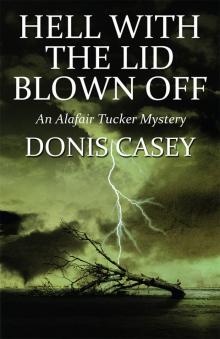 Hell With the Lid Blown Off
Hell With the Lid Blown Off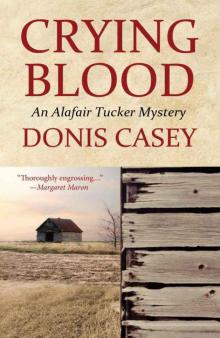 Crying Blood - An Alafair Tucker Mystery
Crying Blood - An Alafair Tucker Mystery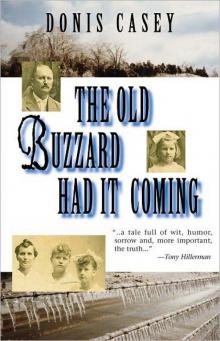 The Old Buzzard Had It Coming: An Alafair Tucker Mystery
The Old Buzzard Had It Coming: An Alafair Tucker Mystery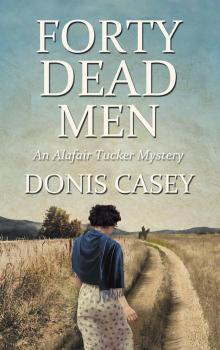 Forty Dead Men
Forty Dead Men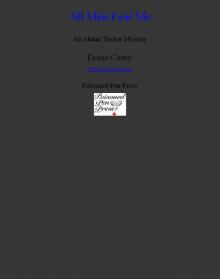 All Men Fear Me
All Men Fear Me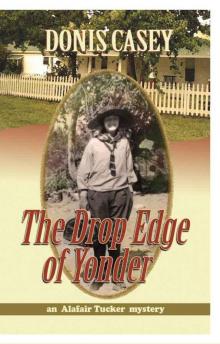 The Drop Edge of Yonder - An Alafair Tucker Mystery
The Drop Edge of Yonder - An Alafair Tucker Mystery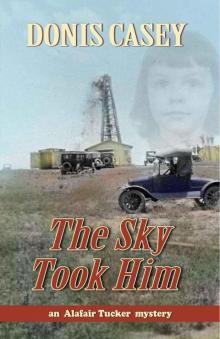 The Sky Took Him - An Alafair Tucker Mystery
The Sky Took Him - An Alafair Tucker Mystery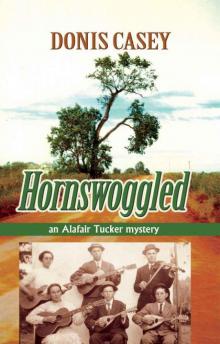 Hornswoggled - An Alafair Tucker Mystery
Hornswoggled - An Alafair Tucker Mystery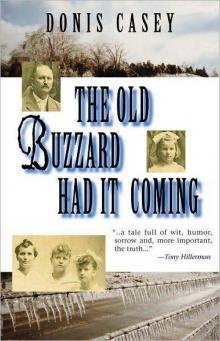 The Old Buzzard Had It Coming
The Old Buzzard Had It Coming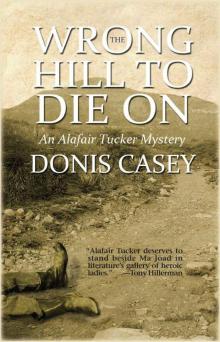 The Wrong Hill to Die On: An Alafair Tucker Mystery #6 (Alafair Tucker Mysteries)
The Wrong Hill to Die On: An Alafair Tucker Mystery #6 (Alafair Tucker Mysteries)